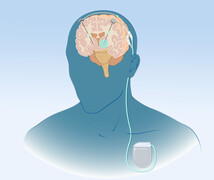If you’ve been diagnosed with a movement disorder, a movement disorder specialist can help reduce your symptoms and enhance your quality of life. Movement disorder specialists are neurologists who have completed a fellowship in movement disorders. This requires one or more years of additional, subspecialty training to understand and treat conditions that affect certain brain regions. According to Duke movement disorder specialist Sneha Mantri, MD, the sooner you get this type of advanced care, the more likely you are to have better outcomes.
Movement disorder specialists can serve as your main neurologist, or they can partner with your local neurologist to treat your Parkinson’s disease, Huntington’s disease, dystonia, ataxia, essential tremor, or other movement disorders. Here Dr. Mantri explains how she and her colleagues put their expertise to work for you.
Managing and Optimizing Medications
There are dozens of medications available to treat movement disorders. Movement disorder specialists know how to prescribe the right medication in the right form at the right dose at the right time -- all while minimizing unwanted side effects. These decisions can be affected by symptoms, disease severity, and other conditions. A movement disorder specialist will consider your unique situation and tailor a medication regimen to your lifestyle. That way you get the most benefit during the times you need it most -- when you're most active.
Offering Advanced Treatment Options
Many movement disorder specialists have the expertise to administer chemodenervation therapies. These injections of toxins like botulinum (for example, Botox) into specific muscles can relieve symptoms like muscle spasms or excess saliva production. Movement disorder specialists identify the right target muscles and determine the right dose.
If you’re a candidate for deep brain stimulation surgery, your movement disorder specialist will partner with a neurosurgeon to pinpoint the best site in your brain for DBS implantation. After surgery, they’ll work with you to adjust your device settings to maximize benefit.
For select patients who are not candidates for DBS surgery, Duke also offers focused ultrasound to relieve essential tremor and Parkinson’s-related tremor.
Treating Non-Motor Symptoms
Although motor symptoms -- those that affect physical movement and coordination -- are the most obvious effects of movement disorders, non-motor symptoms can also have a big impact on daily living. Non-motor symptoms include lightheadedness, skin changes, constipation and urinary problems, memory loss, hallucinations, depression, and anxiety. Movement disorder specialists are trained to identify these symptoms and help people manage them.
Choose an Experienced Center for Your Movement Disorder Care
Receiving care at an experienced center -- like Duke's center at Duke Neurology Morreene Road -- gives you access to an interdisciplinary team of experts in movement disorders, such as pharmacists, speech therapists, and social workers. Physical and occupational therapists can devise individualized exercise regimens to slow the progression of Parkinson’s disease and similar disorders. You may also have access to clinical trials studying new movement disorder drugs and therapies.
“Having the expertise of a fellowship-trained movement disorder specialist on your care team is really helpful for optimizing your care regimen,” Dr. Mantri said. “We get to know what may be going on in our patients’ lives that impacts their medical care, and that's always been very interesting to me. It was a big part of why I went into medicine in the first place.”





